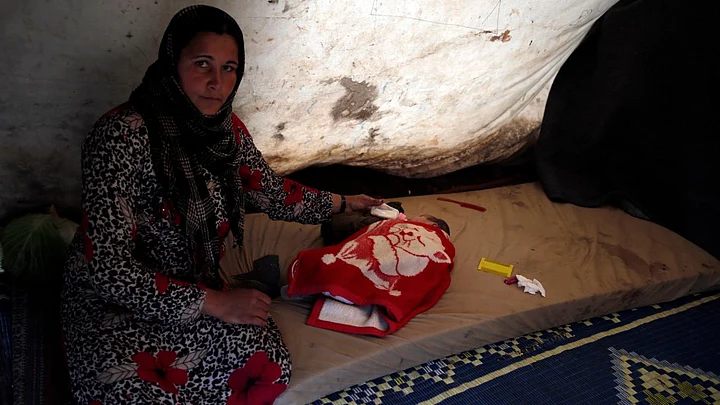For the women living in war-ravaged Syria, their menstrual period has become something they dread.
Without sanitary pads or even clean water, women like Huda go through the painful ordeal, and suffer from diseases linked to their reproductive organs and their period, as reported by the Independent.
“When feminine products started to become rare in 2012, I had a really hard time,” says the 23-year-old from Saqba, a besieged, rebel-held town in the battered Eastern Ghouta area.
She said that the few feminine hygiene products available in Saqba are too expensive for her and her husband to purchase.
“So I had to make do with old cloth,” she says.
But I started getting a lot of infections, so I decided to buy just a few sanitary pads and use one per day so I didn’t go through them quickly.
Reusing old cloth and pads has led to fungal infections, kidney pain, vaginal and urinary tract problems, said Huda.
Even getting treated is a difficult and slow process, given the cost of proper medicine.
More than 860,000 people who live under siege in Syria are facing shortage of essentials like food, water, diesel and medication, among other vital goods.
However, women suffer the most as difficulty to procure basic amenities like clean water leads to gynaecological complications, due to poor hygiene.
Aid groups who provide hygiene product packages to women are only able to deliver sporadically to the besieged parts of the country. Often, what they deliver falls far short of what is required by the women there.
The UN children’s agency quoted to have delivered 84,000 hygiene packs, each with 10 pads in 2016, up from the 17,000 they could deliver in 2015.
But, even if just one-third of the 860,000 people happen to be menstruating women, they would need close to 10 million pads a year.
Laila Bakry, who heads the women’s centre for Eastern Ghouta, said the lack of access to pads makes women resort to “traditional methods” – reusing old rags.
Yet, there is the struggle to find clean fabric as often, there is no water to boil and disinfect the cloth or no electricity or gas.
Rania, an 18-year-old frequenting Bakry’s centre said she first got her period in 2011, when pads, medicines, gas and water were readily available.
Since the government siege cut off food, water, and aid access to Douma three years ago, “everything is hard”, she says.
Even when I’m done with the pain of my period, I have to figure out a way to wash...I don’t know if we will ever get used to this.Rania
Dermatological problems and chronic pain are the other problems Bakry has seen women go through.
There are few gynaecologists available who have enough experience to treat the cases they come across.
Even if a specialised doctor sees her early on, diagnoses the problem and prescribes some medication, the medicine isn’t available. It will take too long to get it, and some people can’t buy it because it’s too expensive.Laila Bakry
Cultural considerations have prevented aid groups from examining the health complications in women, in absence of requisite products.
“Because the issue is so sensitive, health assessment teams have not gathered information on potential medical complications,” says Ingy Sedky of the International Committee of the Red Cross.
In Aleppo, there is an increasing government offensive.
Baraa, a nurse working with a female gynaecologist in the city has said women use torn pieces of cloth in place of sanitary pads and often use expired medicines out of desperation.
Without clean water or proper hygiene, we are seeing gynaecological infections. The doctor I work with says these cases have increased a lot over the past month.Baraa
Since 22 September, almost 500 people have died in the eastern districts as government fighters backed by Russia battle rebel groups there.
The intensity of the fights have put severe pressure on the patients, who often do not bleed at all or bleed more heavily.
“Instability and anxiety play a huge role,” she says.
Source: Independent
(At The Quint, we question everything. Play an active role in shaping our journalism by becoming a member today.)
